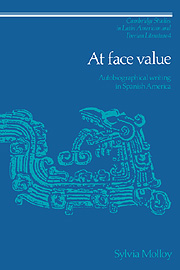Book contents
- Frontmatter
- Contents
- Acknowledgments
- Introduction
- PART I THE SCENE OF READING
- PART II CHILDHOOD AND FAMILY TALES
- 4 Childhood and exile: the Cuban paradise of the Countess of Merlin
- 5 A school for life: Miguel Cané's Juvenilia
- 6 The search for Utopia: Picón Salas looks forward to the past
- 7 A game of cutouts: Norah Lange's Cuadernos de infancia
- PART III MEMORY, LINEAGE AND REPRESENTATION
- Notes
- Bibliography
- Index
5 - A school for life: Miguel Cané's Juvenilia
Published online by Cambridge University Press: 14 September 2009
- Frontmatter
- Contents
- Acknowledgments
- Introduction
- PART I THE SCENE OF READING
- PART II CHILDHOOD AND FAMILY TALES
- 4 Childhood and exile: the Cuban paradise of the Countess of Merlin
- 5 A school for life: Miguel Cané's Juvenilia
- 6 The search for Utopia: Picón Salas looks forward to the past
- 7 A game of cutouts: Norah Lange's Cuadernos de infancia
- PART III MEMORY, LINEAGE AND REPRESENTATION
- Notes
- Bibliography
- Index
Summary
Let us tighten the circle and watch over it.
Miguel Cané, De cepa criollaAs much as a desire for conservation, defensiveness may inform the need to remember the past. Under the patina conferred upon them by nostalgia, childhood and family tales can be provocative ideological statements, especially at times when the autobiographer perceives himself – and the peers he would have share his more or less fantasized communal experience – to be threatened. A particular case in point is that of the Argentine writers of the generation of 1880 (Lucio V. Mansilla, Miguel Cané, Lucio Vicente López, Eduardo Wilde, Eugenio Cambaceres), a loose group whose reason for being owes as much to chronology as it does to social class. Prosperous bourgeois for the most part, these writers occupy prominent and powerful positions in Argentine public life: they are diplomats, politicians and jurists, and simultaneously devote considerable time (and a sustained, often perplexed attention) to the practice of literature. In their writings, they cultivate a fragmentation that is as much aesthetic as it is ideological; shunning generic categories, they also shun a univocal authorial attitude that might prove too explicit and thus confine them to a single image. The literature of the 1880s in Argentina is much given to creative digression – a fireside chat, a well-told story, a pleasant recollection, a well-placed joke.
- Type
- Chapter
- Information
- At Face ValueAutobiographical Writing in Spanish America, pp. 97 - 107Publisher: Cambridge University PressPrint publication year: 1991



